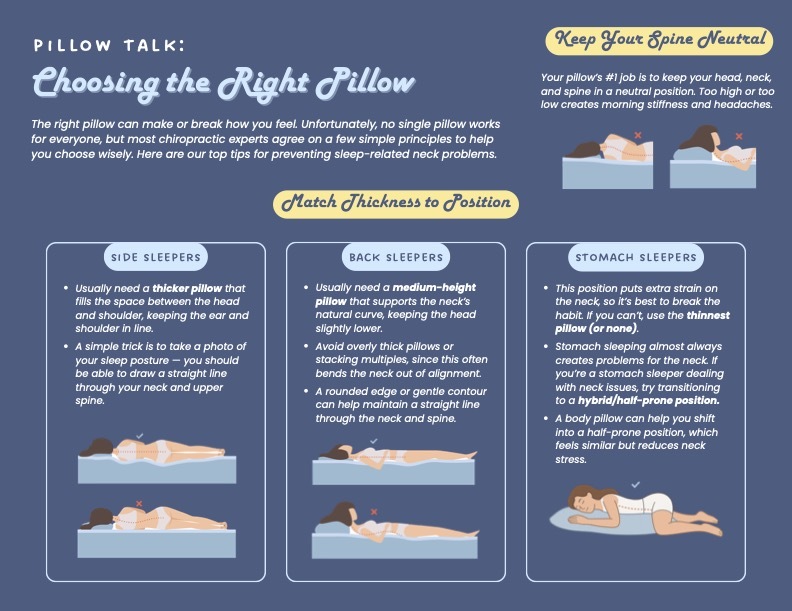
Waking up with neck pain or stiffness? Your pillow might be the cause. The right pillow helps support your spine and reduce tension while you sleep. At Shaw Spine & Sport, we see many patients whose morning neck pain starts with poor pillow or sleep posture. Here’s how to pick one that helps you wake up feeling better.
1. Keep Your Spine Neutral
Your pillow’s main job is to keep your head, neck, and spine in a neutral position—not tilted up or bent down. When the pillow is too thick or too flat, your neck muscles work overtime through the night, leading to stiffness, headaches, or even tingling in the shoulders.
Think of your pillow as support, not a cushion to sink into. The goal is simple: keep your spine straight from top to bottom.
2. Match Pillow Thickness to Your Sleep Position
Each sleep position needs a different level of support:
-
Side sleepers: Choose a thicker pillow that fills the space between your shoulder and head so your neck stays level. Take a quick photo of yourself lying down—your head, neck, and upper back should form one straight line.
-
Back sleepers: A medium-thickness pillow works best. It should cradle the curve of your neck without pushing your head forward. Avoid stacking pillows; this throws your spine out of alignment.
-
Stomach sleepers: This position places the most strain on your neck. If you can’t break the habit, try a half-prone position using a body pillow to support your torso and reduce neck rotation.
3. Consider Adjustable Options
Adjustable pillows—like those with shredded memory foam, buckwheat hulls, or water chambers—let you fine-tune height and firmness.
- Softer mattresses usually need a higher pillow.
- Firmer mattresses require less height.
Testing a few styles is often the only way to find what truly supports your body and reduces morning pain.
4. Prioritize Comfort and Support
The best pillow for neck pain is the one that feels supportive and comfortable to you. Material—memory foam, down, latex, or water—is secondary to how well it maintains alignment through the night.
If your pillow feels lumpy, flat, or leaves you sore, it’s time to replace it. Most chiropractors recommend changing pillows every 1–2 years.
Better Sleep, Better Movement
A quality pillow helps you sleep deeper, recover faster, and reduce neck tension during the day. If neck pain or stiffness keeps returning, it may be time for a chiropractic assessment. At Shaw Spine & Sport, we can evaluate your posture, sleeping position, and pillow setup to help you rest pain-free.






